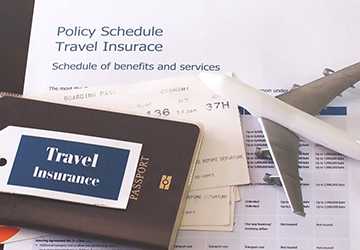Top 6 Insurance Plans for Freelancers
Starting as a freelancer combines freedom with responsibility. The freelance lifestyle offers project options and remote working but requires a thoughtful approach to self-help, where insurance is crucial. In this guide, we explore the intricacies of the top 6 freelance insurance plans, aiming to simplify the information in the conversation and avoid complicated company jargon. This path is about balancing the freedom to choose projects with the responsibility to ensure your well-being. We break down the key points and make them available to freelancers familiar with insurance ins and outs.

1. Health insurance for freelancers
Your well-being is at the core of freelancing, a cornerstone that must be considered carefully. Choosing comprehensive health insurance is more than just a prudent decision; it's necessary. Look for plans beyond the basics and cover routine checkups, unforeseen emergencies, and hefty medical bills. Some innovative providers are taking it a step further and offering telemedicine options that allow you to seek medical advice seamlessly in the workplace. This protects your health and provides you with peace of mind, ensuring that you can concentrate on your work without worrying about unforeseen health issues.
2. Term life insurance
While thinking about the unexpected may not be at the top of your list of preferred activities, taking practical steps to secure your loved one's future is crucial. Choosing term life insurance is a pragmatic decision. This insurance option ensures that your family does not have to bear any unreasonable financial burden in the event of unfortunate events and premature death. This is a powerful yet simple strategy for creating a safety net for the people you care about. This approach ensures clear, straightforward protection by minimizing unnecessary complexity and enhances the well-being of those you care about.
3. Occupational disability insurance
In the world of freelancing, your ability to work is your most asset. But what if unforeseen circumstances impact your productivity? The focus is occupational disability insurance, designed to replace part of your income during difficult times. Acting as a safety net, it covers essential costs and gives you peace of mind if you are temporarily unable to work due to an accident or illness. This pragmatic strategy will support you during unexpected blows and strengthen your financial stability.
4. Professional Liability Insurance
Mistakes are part of every career, and freelancing is no exception. However, customer dissatisfaction may escalate the situation into a legal dispute. Purchase professional liability insurance, also known as errors and omissions insurance. This impressive protection is a powerful shield against potential legal challenges related to your professional services. His firm defence safeguards your hard-earned reputation, ensures financial stability, and avoids unnecessary detours. In the face of adversity, this insurance is a reliable ally, providing an immediate and durable response to the challenges that may arise throughout your freelance career.
5. Property insurance for freelancers working from home
For countless freelancers, home is both an emotional center and a professional stage. Choosing property insurance is a rational decision if your workplace contains valuable tools in your industry - whether it's computers, cameras, or other critical equipment. This coverage acts as a shield, protecting your assets from unforeseen events such as theft or damage and ensuring the ongoing maintenance of your freedom tools. This simple but crucial measure dramatically improves the overall safety and resiliency of the workplace and emphasizes its importance in freelance life.

6. Retirement planning for freelancers
In the busy daily life of a freelancer, retirement planning often becomes a secondary concern. However, securing your financial future remains a priority. Research an Individual Retirement Account (IRA) or a Simplified Employee Retirement Plan (SEP), as they offer freelancers a simplified and efficient way to build a retirement fund with valuable tax benefits. This simple yet effective step will ensure a financial stress-free future and emphasize your vision and commitment to financial responsibility.
Overcoming challenges as a freelancer
Unpredictable sources of income: Freelancers often face income fluctuations. To prepare for this challenge, consider setting up an emergency fund. This financial buffer helps mitigate the impact of irregular payments and workload fluctuations and provides stability during times of crisis. Maintain a work-life balance: Work-life balance is crucial to a freelancer’s well-being. Set clear boundaries to prevent burnout. Define specific working hours, create a dedicated workspace and establish routines that allow you to unplug from work to ensure a healthier, more sustainable lifestyle. A strategic approach to freelancing: While freelancing offers freedom, a strategic and holistic approach is crucial to long-term success. This includes planning for future uncertainties, upskilling, and adapting to market trends. A proactive mindset helps navigate the dynamic landscape of freelancing. Acknowledge challenges: It is crucial to recognize and address challenges head-on. Instead of seeing obstacles as setbacks, see them as opportunities for growth. Acknowledge the uncertainty associated with freelancing and adopt a mindset that allows you to adapt and thrive in the face of challenges. Manage workload fluctuations: Workload fluctuations are common among freelancers. Contingency plans, such as diversifying your client base or undertaking alternative projects, can help mitigate the impact of unpredictable working patterns and ensure a more stable revenue stream. Create a fulfilling career: The ultimate goal is to create a freelance job that is both financially rewarding and fulfilling. It's about finding a balance between pursuing projects that align with your passion and achieving your financial goals. You can build a sustainable and enjoyable freelance career by overcoming challenges with resilience and vision.
Conclusion
All in all, exploring the world of insurance doesn't have to be difficult for freelancers. By considering your needs and choosing the appropriate plan, you can build a strong safety net for yourself and your loved ones. Health insurance, life insurance, disability insurance, professional liability insurance, property insurance and pension insurance together form the backbone of a comprehensive insurance strategy. The key is simplicity – a simple approach ensures complete protection. As you understand the complexities of freelancing, keeping this simple focus will help you stay protected and focus on your strengths - making you stand out in the freelancing world!


